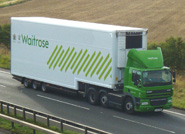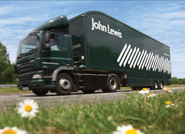Jerry Ward, Manager Legal Operations (Transport) for the John Lewis Partnership tells us how FORS has been instrumental in helping this leading edge retailer maintain and improve on its high standards.
With key sites in and around London and a network of home delivery vehicles the John Lewis Partnership was invited to become one of the original FORS accredited companies. Jerry explains that “as a Partnership we have always set very high standards for ourselves and much of what we were doing in terms of safety, compliance and environmental efficiency dovetailed with the aims of FORS”.
“We passed our bronze assessment first time round, and to me the process was a very positive one which confirmed that we were doing things right”.
Since the early days of FORS the John Lewis Partnership has worked very closely with TfL. Jerry comments, “one of the biggest benefits that we have gained from FORS is a good two-way working relationship with TfL. The knowledge transfer between our two organisations works both ways and being FORS accredited means there is always an opportunity for us to learn and share with other operators.”
“Whenever I attend a FORS workshop there’s always an interesting learning point – it gives me a superb opportunity to find out about new things that I’m not doing, should be doing or could be doing”
“When the criteria for silver accreditation was set we wanted to make sure that we were amongst the first to reach that level. We were in FORS from day one and wanted to help TfL keep the momentum of FORS going – TfL is investing time and money into the scheme and we felt that it was the right thing to do to support it”.
The FORS standards are upheld whenever possible, with talks given by the Partnership at various FORS workshops. “You always come away from a workshop with at least one new idea to implement, you realise that you don’t always know as much as you thought you did” says Jerry.
A prime example of this is the FORS post-collision procedures and analysis workshop. As a company we have always been very careful to monitor and manage down safety incidents however small they may be. I used the information given to me at this workshop to bolster our investigation procedure and make sure that we were capturing all incidents regardless of severity”.
“We run two safety related schemes, ROSPA, and a risk rating scheme which give points to drivers involved in accidents. It gives branch managers the information they need to manage driving at work and depending on the severity of an incident the outcome may be to take the driver off the road, provide re-training or follow the incident up with a one to one discussion. We measure this in terms of a benchmark risk score which is set at 3.3, the current risk score is placed at 2.6, which is encouraging”
“We deliver our own Driver Certificate of Professional Competence (CPC) training and over the last two years the subject matter has included safe and fuel efficient driving, environmental and CO2 awareness and road risk. We have recently started sending some drivers onto the FORS Safe Urban Driving course as it complements our own courses. We also ensure that our drivers are given refresher training in safe and fuel efficient driving each year, this helps keep our incident levels low as well as helping us work towards our environmental commitments.”
The Partnership has committed to reducing its overall CO2 output, not only within the vehicle fleet, but also its stores and warehouses. “We have made annual fuel savings of around 6% and significant associated CO2 savings by implementing some tried and tested methods such as fitting aerodynamic equipment, having better loaded trailers, using double deck trailers and carrying out more back hauling. It’s an upfront investment but we’ve found that devices such as air deflectors on double deck trailers basically pay for themselves within a year”.
“We’ve achieved annual fuel savings of around 6% and significant associated CO2 savings”
“Because we spend most of our time delivering in urban or residential areas we are extremely sensitive to the issue of cyclists and other vulnerable road users. We were really pleased to have been involved in the recent TfL and Barclays Cycle Superhighways HGV Technology Trial. The Partnership recognises that cameras and sensing equipment are important tools to help prevent cyclist injuries in London, and our involvement in the trial, along with our commitment to gold FORS accreditation, has given us the impetus to carry out our own trial to evaluate a system that can over the next 12 months be fitted to all our vehicles over 18 tonnes that deliver into London.”
Moving forward John Lewis estimate that in 2013 they will make fuel savings equivalent to around £500,000 through the use of telematics and an estimated saving of £80,000 a year in accident repair costs by directing more maintenance in-house.



